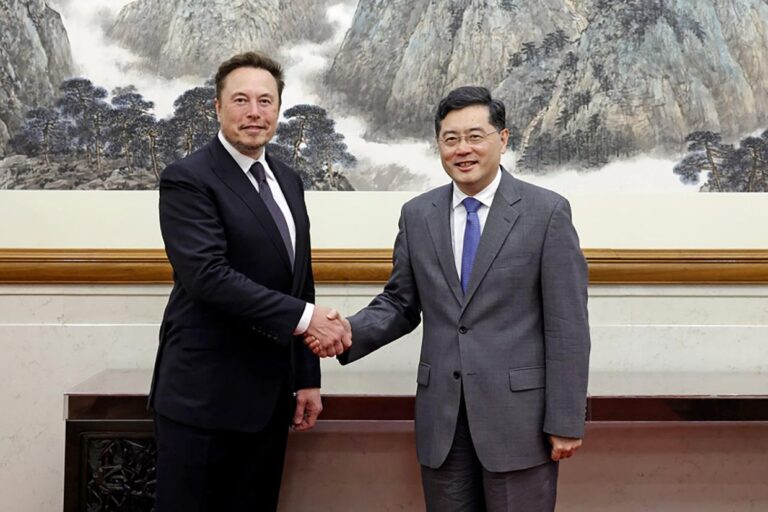Elon MuskŌĆÖs Expanding Ventures in China: Implications for U.S. National Security
Elon MuskŌĆÖs increasing business footprint in China is attracting heightened attention from U.S. national security analysts. His involvement spans from TeslaŌĆÖs Shanghai manufacturing hub to collaborative artificial intelligence projects, raising concerns about potential vulnerabilities. The convergence of MuskŌĆÖs entrepreneurial pursuits with his advisory roles to U.S. government agencies on technology and defense matters creates a complex scenario where economic interests may conflict with national security priorities.
Primary concerns include:
- Supply Chain Risks: TeslaŌĆÖs dependence on Chinese suppliers for semiconductors and batteries could expose critical technologies to foreign interference or supply disruptions.
- Data Protection Challenges: The exchange of data between MuskŌĆÖs enterprises and Chinese partners might increase risks of surveillance or intellectual property theft.
- Advisory Conflicts: MuskŌĆÖs influence on U.S. policies related to space exploration and AI could be compromised by his overlapping business interests in China.
| Industry | Chinese Partnership | Security Concern |
|---|---|---|
| Electric Vehicle Manufacturing | Shanghai Gigafactory Operations | Supply chain vulnerabilities |
| Artificial Intelligence | Collaborative Research Initiatives | Risk of data breaches |
| Space Technology | Satellite Data Collaborations | Dual-use technology risks |
Navigating the Intersection of Private Enterprise and National Security
MuskŌĆÖs extensive business activities in China, spanning automotive, renewable energy, and aerospace sectors, highlight the intricate challenges when private companies operate at the nexus of economic opportunity and national security. Tesla and SpaceX, for instance, manage critical technologies and infrastructure that are vital to U.S. strategic interests. This dual engagement raises pressing questions about protecting sensitive data, maintaining control over supply chains, and managing the influence of Chinese regulatory frameworks on American innovation.
Experts emphasize several key issues:
- Data Access Risks: Chinese regulations may compel companies to share information, potentially compromising data security within MuskŌĆÖs Chinese operations.
- Supply Chain Vulnerabilities: Heavy reliance on Chinese manufacturing and components could be exploited amid geopolitical tensions or trade disputes.
- Regulatory Conflicts: Balancing U.S. export restrictions with Chinese domestic laws presents complex compliance challenges that may affect security commitments.
| Sector | U.S. Security Concern | Role in Chinese Market |
|---|---|---|
| Automotive | Advanced battery technology and cybersecurity | Key manufacturing and sales center |
| Space Exploration | Satellite encryption and technology safeguards | Joint research and development efforts |
| Renewable Energy | Influence over grid infrastructure security | Production of solar energy components |
Examining Dual Loyalty Risks in Tech and Automotive Sectors
The convergence of technology and automotive industries with geopolitical interests creates a complex environment where dual loyalties can jeopardize national security. Companies operating across U.S. and Chinese markets, especially in cutting-edge fields like electric vehicles and AI, face heightened scrutiny over potential conflicts of interest and intellectual property protection. Critical risks include:
- Exposure of sensitive data through international partnerships
- Dependence on foreign supply chains susceptible to political manipulation
- Influence of foreign government policies on corporate governance
- Conflicts between profit-driven motives and national security imperatives
Recognizing these risks is essential, particularly when influential executives shape policy or innovation strategies. Maintaining a balance between encouraging global business expansion and safeguarding national interests requires stringent transparency and oversight. The table below outlines potential impacts associated with dual loyalty scenarios in these sectors:
| Risk Category | Possible Consequences |
|---|---|
| Intellectual Property | Unauthorized transfer of proprietary technologies to competitors or foreign entities |
| Supply Chain Integrity | Susceptibility to disruptions or manipulation during geopolitical conflicts |
| Regulatory Influence | Potential policy decisions favoring foreign interests over U.S. security |
| Market Fairness | Competitive imbalances arising from conflicting loyalties |
Strategies to Protect U.S. Security Without Hindering Innovation
Addressing the challenges posed by the intertwining of U.S. tech leadership and Chinese business interests requires nuanced policy approaches that safeguard national security while encouraging innovation. Transparency must be prioritized through stringent conflict-of-interest disclosures for executives with significant foreign engagements, ensuring that security concerns are not eclipsed by global business ambitions. Customized regulations focusing on ownership structures and data-sharing protocols within multinational technology firms can provide essential protections without stifling growth.
Additionally, bolstering domestic research and development efforts is critical to reducing reliance on foreign supply chains, especially in strategic areas like semiconductors and artificial intelligence. Recommended actions include:
- Refining export controls to precisely restrict sensitive technology transfers.
- Expanding collaborations between public and private sectors to foster innovation in secure environments.
- Conducting ongoing risk evaluations that adapt to shifting geopolitical landscapes.
| Policy Instrument | Main Advantage | Implementation Challenge |
|---|---|---|
| Conflict-of-Interest Transparency | Reduces risk of foreign influence | Potential resistance from corporate leaders |
| Targeted Export Controls | Secures critical technologies | Possible disruption to international supply chains |
| Public-Private Innovation Partnerships | Enhances domestic R&D capabilities | Requires long-term funding and commitment |
Looking Ahead: Balancing Global Business Expansion with National Security
As Elon Musk continues to broaden his business operations in China, the intertwining of his financial and operational interests with the country presents growing challenges to his role in U.S. national security dialogues. Effectively managing these overlapping interests will demand increased vigilance from policymakers and stakeholders, as the consequences extend beyond corporate strategy into the broader sphere of international security. This situation exemplifies the complex interplay between global commerce and national security in an era marked by intensifying geopolitical competition.







